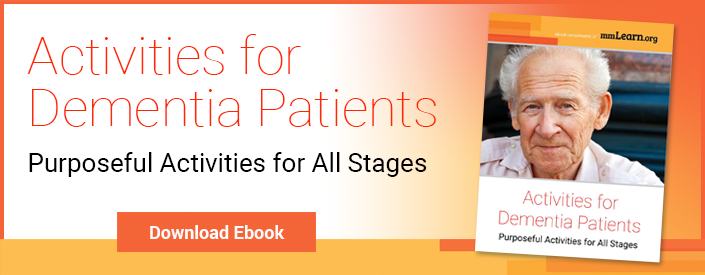
Anyone who has served as a caretaker for a person with dementia knows that “challenging” doesn’t begin to describe what it is like to experience the mood swings, cognitive decline, and behavioral changes in your loved one.
It’s a daily struggle and a highly unpredictable one.
One day you might experience a deep, calm connection with your loved one, and the next day (minute, or hour), they may express rage and lash out in frustration.
The fact is, dementia is a degenerative brain disease, which leads to ups and downs for caregivers as well as patients.
Being a caregiver for someone with dementia involves accepting the uncertainty and unpredictability of the disease while also creating comforting routines. It also requires patience and forgiveness, for both yourself and your loved one.
The 12 Most Common Problem Behaviors
In the following mmLearn.org caregiver training video, Dr. David Smith identifies the 12 most common problem behaviors seen in elderly residents with dementia.
Dementia is on the rise. Dr. Smith notes that if current trends continue, 12 million people may have Alzheimer’s Dementia by the middle of this century. Currently, 70% of nursing home residents experience some level of dementia, and 40% are identified as having behavior problems. That means more and more caregivers are learning how to care for people with dementia and to manage their related behaviors.
The 12 most common behavior symptoms listed by Dr. Smith are
- Communication difficulties
- Passive aggression
- Disruptive behavior
- Manipulative
- Demanding interaction
- Speech content
- Socially objectionable
- Verbal aggression
- Noisy
- Active aggression
- Restlessness
- Delusions/hallucinations
Dr. Smith notes that behaviors are unique to every individual and are not particularly useful for evaluation and treatment. But caregivers may recognize some of these behaviors and feel less alone as they care for loved ones. They can also benefit from learning strategies for caring for people with dementia.
Understanding Behavior Disturbances
In another mmLearn.org training video for caregivers, Dr. Jason Schillerstrom, a geriatric specialist in San Antonio, Texas, discusses the emotions underlying many behavioral disturbances in people with dementia.
One of the key takeaways from Dr. Schillerstrom’s training is that memory loss, one of the main indicators of dementia, is rarely a reason for seniors being institutionalized. ”In general the reason people are placed in nursing home settings is either because of behavior challenges or because of functional loss,” he says.
He discusses some of the common behavioral disturbances, including apathy, agitation, irritability, sleep and appetite changes, wandering behaviors, hypersexuality, delusions, and hallucinations.
According to Dr. Schillerstrom, agitation and apathy — opposite sides of the spectrum — are some of the toughest behaviors for caregivers to manage.
Advice for Caregivers
It’s normal to become frustrated, upset, or angry at a loved one, even though you know they are not in control of their impulsive, childlike, or even violent behaviors. No matter how patient and loving you are, you won’t be able to stop negative behaviors — they are part of the disease.
However, we do have some advice that may help reduce the frequency and intensity of dementia behaviors.
- Remain calm and remember not to take dementia behaviors personally.
- Give space when a loved one is behaving aggressively
- Try again later if the person is resisting something you are helping them with, like hygiene.
- Avoid arguing with someone with dementia.
- Consider the causes of the behavior, such as pain, lack of sleep, medication changes, or emotional factors like loneliness.
- Vary your approach by offering love, support, and validation instead of trying to reason with the person.
- Distract, or validate, especially if you’re finding it difficult to redirect your loved one from an undesirable behavior.
- Create routines and rituals that help comfort people with dementia and reduce stress and uncertainty.
Exploring Purposeful Activities for Dementia Patients
Caregivers work around the clock to provide loving care to their relatives with dementia. It helps to learn from others who have shared similar experiences.
In the ebook Activities for Dementia Patients, Maria Wellisch, R.N. L.N. F. A., shares dementia activities for caregivers, based on her background as a long-term care nurse and her experience caring for her own mother. She provides enriching activities that caregivers can do with ordinary household objects — like PVC pipe, pocketbooks, and paint swatches — facilitating fun and meaningful interactions with dementia patients.
Most caregivers are eager to discover purposeful ways to connect with their loved ones. These activities won’t cure dementia or end frustrating behaviors. But they give us a chance to reset and offer up new pathways for caring for the people we love.

